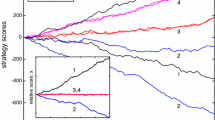Abstract
In this paper the extended model of Minority game (MG), incorporating variable number of agents and therefore called Grand Canonical, is used for prediction. We proved that the best MG-based predictor is constituted by a tremendously degenerated system, when only one agent is involved. The prediction is the most efficient if the agent is equipped with all strategies from the Full Strategy Space. Despite the casual simplicity of the method its usefulness is invaluable in many cases including real problems. The significant power of the method lies in its ability to fast adaptation if λ-GCMG modification is used. The success rate of prediction is sensitive to the properly set memory length. We considered the feasibility of prediction for the Minority and Majority games.
Access this chapter
Tax calculation will be finalised at checkout
Purchases are for personal use only
Preview
Unable to display preview. Download preview PDF.
Similar content being viewed by others
References
Box, G., Jenkins, G.M., Reinsel, G.: Time Series Analysis: Forecasting & Control, 3rd edn. Prentice Hall (1994)
Challet, D., Marsili, M.: Phase transition and symmetry breaking in the minority game. Physical Review E 60, 6271–6274 (1999)
Challet, D., Marsili, M.: Relevance of memory in minority games. Physical Review E 62, 1862–1868 (2000)
Challet, D., Marsili, M., Zhang, Y.C.: Modeling market mechanism with minority game. Physica A 276, 284–315 (2000)
Challet, D., Zhang, Y.C.: Emergence of cooperation and organization in an evolutionary game. Physica A 246, 407–418 (1997)
Challet, D., Zhang, Y.C.: On the minority game: Analytical and numerical studies. Physica A 256, 514–532 (1998)
Chen, F., Gou, C., Guo, X., Gao, J.: Prediction of stock markets by the evolutionary mix-game model. Physica A 387, 3594–3604 (2008)
Gou, C.: Predictability of Shanghai Stock Market by agent-based mix-game model. In: Proceeding of IEEE ICNN&B 2005, pp. 1651–1655 (2005)
Gou, C.: Dynamic behaviors of mix-game models and its application. Chinese Physics 15, 1239 (2006)
Jefferies, P., Hart, M.L., Hui, P.M., Johnson, N.F.: From market games to real-world markets. The European Physical Journal B 20, 493–501 (2001)
Johnson, N.F., Lamper, D., Jefferies, P., Hart, M.L., Howison, S.: Application of multi-agent games to the prediction of financial time series. Physica A 299, 222–227 (2001)
Krause, A.: Evaluating the performance of adapting trading strategies with different memory lengths. In: Corchado, E., Yin, H. (eds.) IDEAL 2009. LNCS, vol. 5788, pp. 711–718. Springer, Heidelberg (2009)
Lillo, F., Farmer, J.D.: The long memory of the efficient market. Studies in Nonlinear Dynamics & Econometrics 8, 1–33 (2004)
Wawrzyniak, K., Wiślicki, W.: Multi-market minority game: breaking the symmetry of choice. Advances in Complex Systems 12, 423–437 (2009)
Wawrzyniak, K., Wiślicki, W.: Phenomenology of minority games in efficient regime. Advances in Complex Systems 12, 619–639 (2009)
Wawrzyniak, K., Wiślicki, W.: Mesoscopic approach to minority games in herd regime. Physica A 391, 2056–2082 (2012)
Author information
Authors and Affiliations
Corresponding author
Editor information
Editors and Affiliations
Rights and permissions
Copyright information
© 2014 Springer-Verlag Berlin Heidelberg
About this paper
Cite this paper
Wawrzyniak, K., Wiślicki, W. (2014). Grand Canonical Minority Game as a Sign Predictor. In: Kamiński, B., Koloch, G. (eds) Advances in Social Simulation. Advances in Intelligent Systems and Computing, vol 229. Springer, Berlin, Heidelberg. https://doi.org/10.1007/978-3-642-39829-2_18
Download citation
DOI: https://doi.org/10.1007/978-3-642-39829-2_18
Publisher Name: Springer, Berlin, Heidelberg
Print ISBN: 978-3-642-39828-5
Online ISBN: 978-3-642-39829-2
eBook Packages: EngineeringEngineering (R0)




